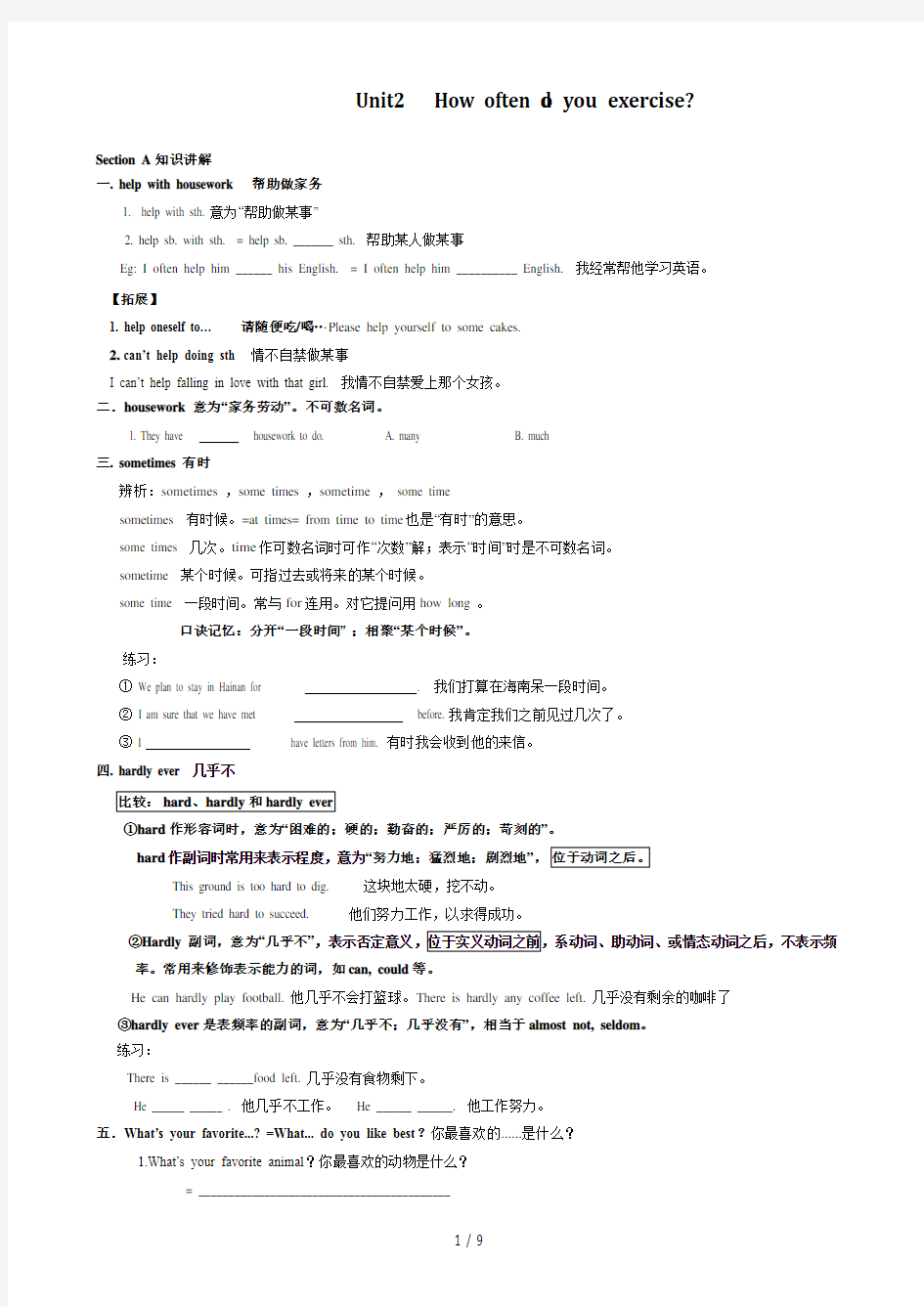人教版八年级上册-Unit2知识点讲解与练习

- 1、下载文档前请自行甄别文档内容的完整性,平台不提供额外的编辑、内容补充、找答案等附加服务。
- 2、"仅部分预览"的文档,不可在线预览部分如存在完整性等问题,可反馈申请退款(可完整预览的文档不适用该条件!)。
- 3、如文档侵犯您的权益,请联系客服反馈,我们会尽快为您处理(人工客服工作时间:9:00-18:30)。
Unit2 How often d o you exercise?
Section A知识讲解
一. help with housework 帮助做家务
1. help with sth. 意为“帮助做某事”
2. help sb. with sth. = help sb. _______ sth. 帮助某人做某事
Eg: I often help him ______ his English. = I often help him __________ English. 我经常帮他学习英语。【拓展】
1. help oneself to… 请随便吃/喝···Please help yourself to some cakes.
2.can’t help doing sth 情不自禁做某事
I can’t help falling in love with that girl. 我情不自禁爱上那个女孩。
二.housework 意为“家务劳动”。不可数名词。
1. They have housework to do. A. many B. much
三. sometimes 有时
辨析:sometimes ,some times ,sometime , some time
sometimes 有时候。=at times= from time to time也是“有时”的意思。
some times 几次。time作可数名词时可作“次数”解;表示“时间”时是不可数名词。
sometime 某个时候。可指过去或将来的某个时候。
some time 一段时间。常与for连用。对它提问用how long 。
口诀记忆:分开“一段时间” ;相聚“某个时候”。
练习:
① We plan to stay in Hainan for . 我们打算在海南呆一段时间。
② I am sure that we have met before. 我肯定我们之前见过几次了。
③ I have letters from him. 有时我会收到他的来信。
四. hardly ever 几乎不
①hard作形容词时,意为“困难的;硬的;勤奋的;严厉的;苛刻的”。
hard作副词时常用来表示程度,意为“努力地;猛烈地;剧烈地”
This ground is too hard to dig. 这块地太硬,挖不动。
They tried hard to succeed. 他们努力工作,以求得成功。
②Hardly 副词,意为“几乎不”
率。常用来修饰表示能力的词,如can, could等。
He can hardly play football. 他几乎不会打篮球。There is hardly any coffee left. 几乎没有剩余的咖啡了
③hardly ever是表频率的副词,意为“几乎不;几乎没有”,相当于almost not, seldom。
练习:
There is ______ ______food left. 几乎没有食物剩下。
He ______ ______ . 他几乎不工作。 He ______ ______. 他工作努力。
五.What’s your favorite...? =What... do you like best?你最喜欢的......是什么?
1.What’s your favorite animal?你最喜欢的动物是什么?
= __________________________________________
六. free 意为“空闲的,有空的”反义词busy。 be free 意为“闲着,有空”
eg::He is free now.他现在有空。
拓展:free还可译为“免费的”
Eg:The tickets are free. 票是免费的。
七. quite full 很忙,相当忙.
1. adj. full 还可译为“满的,充满的”。反义词是empty,意为“空的”。
Eg:The bus was full when they got there. 翻译________________________________________.
拓展:A be full of B. = A be fill with B; A中充满了B。
The room is full of students. The bus is full of people.
The hall is _______ people. A. fill with B. full with C. filled of D. filled with
2.full adj. “饱的”。其反义词是hungry,意为“饥饿的”。
Are you hungry or full?你饿了还是饱了?
Eg:I can’t eat any more,I am quite full. 我不能再吃了,我相当饱了。
八. maybe “也许,大概,可能”,常位于句首。
Eg:Maybe he knows Tom. 也许他认识Tom。
辨析:maybe 和may be
Lily an English teacher. Lily可能是一名英语老师。
=________________________________________
九.at least 意为“至少”。其反义词为at most “最多”。
Eg:There are at least 1,500 students in our school. _____________________________________。
十. how often意为“多久一次”,常用于对时间频率的提问。回答可用once/twice/three times a day(一天一/两/三次),
sometimes(有时),never(从不),very often(经常)等。
How often do you watch TV? 你多久看一次电视?
【拓展】
十一.look、see、watch和read辨析:
look为不及物动词,后接宾语时须用介词at,指看的动作。
see着重于看的后果,即“看到,看见”。
read多指“看书、报”,这里的“看”实为“读”。
watch表示“注视,观看,监视”之意。也常用于“看电视,看比赛”等短语中。
